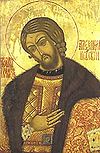- Alexander Dargomyzhsky
-
Alexander Sergeyevich Dargomyzhsky (Russian: Александр Сергеевич Даргомыжский) (February 14, 1813 – January 17, 1869) was a 19th century Russian composer. He bridged the gap in Russian opera composition between Mikhail Glinka and the later generation of The Five and Tchaikovsky.
Dargomyzhsky was educated in St. Petersburg. He was already known as a talented musical amateur when in 1833 he met Glinka and was encouraged to devote himself to composition. His opera Esmeralda (libretto by composer, based on Victor Hugo's The Hunchback of Notre Dame) was composed in 1839 (performed 1847), and his Rusalka was performed in 1856; but he had little success or recognition either at home or abroad, except in Belgium, until the 1860s, when he became the elder statesman, but not a member, of The Five.
His last opera, The Stone Guest, is his most famous work, known as a pioneering effort in melodic recitative. With the orchestration and the end of the first scene left incomplete at his death, it was finished by César Cui and Nikolai Rimsky-Korsakov, and was much prized by The Five for what was perceived as its progressive approach to operatic expression. It was premiered in 1872, but never became a lasting standard operatic repertoire item.
Dargomyzhsky also left some unfinished opera projects, among them an attempted setting of Pushkin's Poltava, from which a duet survives. Besides operas, his other compositions include numerous songs, piano pieces, and some orchestral works.
Bibliography
- Richard Taruskin, Opera and Drama in Russia As Preached and Practiced in the 1860s. New ed. Rochester: University of Rochester Press, 1993.
- Cui, La musique en Russie (Paris, 1880)
- Pougin, Essai historique sur la musique en Russie (Turin, 1897)
- Fétis, Biographie universelle des musiciens (Paris, 1862)
External links
 This article incorporates text from a publication now in the public domain: Chisholm, Hugh, ed (1911). Encyclopædia Britannica (11th ed.). Cambridge University Press.
This article incorporates text from a publication now in the public domain: Chisholm, Hugh, ed (1911). Encyclopædia Britannica (11th ed.). Cambridge University Press.- This article incorporates text from an edition of the New International Encyclopedia that is in the public domain.
People from Russia Leaders and religious - Pre-1168
- 1168–1917
- 1922–1991
- 1991–present
- RSFSR leaders
- General secretaries
- Soviet premiers (1st deputies)
- Soviet heads of state (and their spouses)
- Prime ministers (1st deputies)
- Foreign ministers
- Prosecutors general
- Metropolitans and patriarchs
- Saints

Military and explorers - Field marshals
- Soviet marshals
- Admirals
- Aviators
- Cosmonauts
Scientists and inventors - Aerospace engineers
- Astronomers and astrophysicists
- Biologists
- Chemists
- Earth scientists
- Electrical engineers
- IT developers
- Linguists and philologists
- Mathematicians
- Naval engineers
- Physicians and psychologists
- Physicists
- Weaponry makers
Artists and writers Sportspeople - Chess players
Categories:- 1813 births
- 1869 deaths
- Russian composers
- Romantic composers
- Opera composers
Wikimedia Foundation. 2010.

